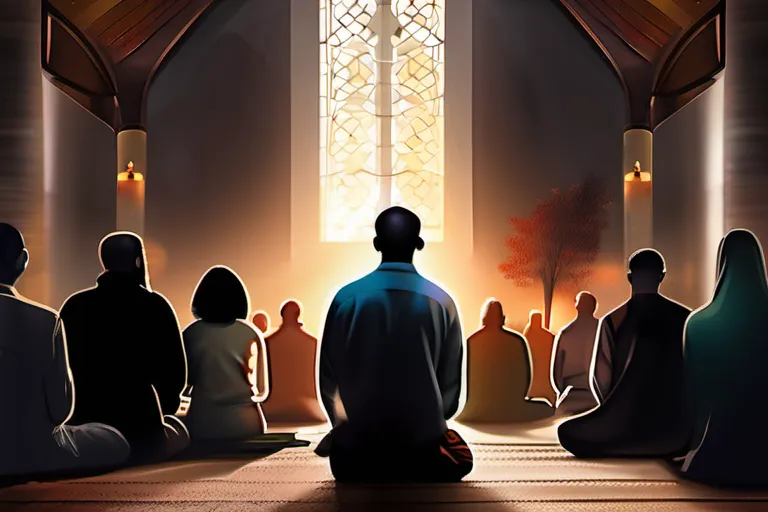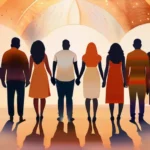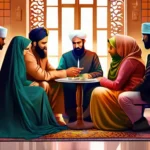Exploring the role, impact, and relevance of religion in modern society.
In today’s diverse and interconnected world, understanding the role and importance of religion is crucial. This article delves into the various aspects that make religion an integral part of contemporary society.
The Historical Evolution of Religion
The journey of religion through time is like a vast river, flowing from its humble beginnings to the mighty streams that shape our modern world. Let’s delve into the origins and development of major religions to understand their profound impact on human civilization.
Imagine the world in 3500 BCE when the first written records of the Sumerians emerged. They carved stories of gods and goddesses onto clay tablets, marking the birth of religious belief systems that would later influence much of what we know today. How did these early deities shape the societal structures and moral codes of their people? Was it just a way to explain natural phenomena or did they serve a deeper purpose in unifying communities?
Moving forward to 600 BCE, Buddhism and Jainism emerged in ancient India, offering a path to enlightenment that challenged traditional Vedic rituals. These religions emphasized personal spiritual development over material wealth, providing alternatives for those seeking meaning beyond the mundane. Can you imagine the shock waves these teachings sent through society? How did they transform the way people perceived life and death?
In the Middle East around 570 CE, the birth of Islam revolutionized the region’s religious landscape. With its call to unity in faith and action, it bridged the gap between spirituality and community service. How did this new religion spread so rapidly across continents, influencing everything from architecture to governance? What lessons can we draw from its ability to adapt while maintaining core values?
Meanwhile, in ancient Greece, philosophers like Socrates and Plato began questioning traditional beliefs, laying the groundwork for rational thought and scientific inquiry. Could it be that these early thinkers were sowing seeds of skepticism that would eventually challenge religious dogma? How do you reconcile faith with reason in today’s world?
The evolution of Christianity from a small sect to the dominant religion of the Roman Empire is another fascinating narrative. Its journey through persecution, conversion, and finally state sponsorship reshaped Western culture profoundly. Can we see echoes of this transformation in current religious dynamics? How does the interplay between church and state continue to influence society today?
Through these stories, we can trace the roots of major world religions, understanding not just their historical significance but also their ongoing relevance. Each religion has its unique path, yet they all share a common thread – the quest for meaning in an often chaotic world.
Religion in Contemporary Society
Can religion still hold its ground in today’s fast-paced, ever-changing society? In a world where technology and globalization dominate our lives, it might seem that traditional beliefs are losing their relevance. But delve into the heart of modern communities, and you’ll find that religion continues to play an indispensable role. Let’s explore how religion intertwines with politics, culture, and personal identity in contemporary times.
Consider the fabric of a community as the threads of various beliefs woven together. Religion often acts like the strongest thread, holding society together during times of crisis or change. Take, for instance, the role of religious leaders who rally communities in political movements, guiding them with moral and ethical principles. These leaders become the voice of the voiceless, advocating for justice and human rights. How many times have we seen faith groups mobilizing voters or organizing relief efforts after natural disasters? Their influence extends far beyond the walls of a church or mosque.
Culture is another fertile ground where religion flourishes. Festivals, rituals, and traditions deeply rooted in religious practices help preserve cultural heritage. Think about how Christmas transforms cities into a whispering tapestry of lights and carols, or how Diwali illuminates homes with the glow of tiny lamps, celebrating victory over darkness. These events not only bring people together but also strengthen communal bonds and foster a sense of belonging.
On an individual level, religion serves as a compass guiding personal identity. For many, it provides a framework for understanding their place in the world, setting moral standards, and finding meaning amidst life’s uncertainties. Consider the metaphor of a river; just as water carves through rock to form its course, religion can shape one’s journey through life, offering direction and comfort during turbulent times.
Thus, while some might argue that modern society has moved past religious influence, it is clear that religion remains a powerful force. It shapes our politics, enriches our culture, and profoundly influences personal identity. As we move forward, understanding the role of religion in today’s society becomes increasingly important for building cohesive communities and navigating the complexities of the world around us.
The Cultural Significance of Religion
The Cultural Significance of Religion: Explore how religion shapes and reflects cultural values, traditions, and practices.
Have you ever wondered why certain holidays are celebrated with such fervor? Or why specific customs continue to be passed down through generations? The answer often lies in the deep-rooted influence of religion. Religion acts as a cornerstone that binds communities together, shaping their collective identity and values. Think of it like a vast tree; its roots stretch deep into the earth, nourishing the soil and providing stability for the branches above. In much the same way, religious practices and beliefs form the foundation upon which cultural traditions are built.
Consider the vibrant festivals that bring communities together during festive seasons. These celebrations often reflect religious narratives or events, such as Christmas for Christians or Diwali for Hindus. Such festivals not only celebrate faith but also reinforce community bonds through shared rituals and festivities. It’s like a grand family gathering where everyone comes together to honor their heritage and strengthen their ties.
Moreover, religious texts and teachings provide moral guidance that influences social behavior and ethical standards. The Bible, for instance, has profoundly impacted Western culture with its emphasis on virtues such as love, charity, and justice. Similarly, the Koran has shaped Islamic societies through principles of honesty, compassion, and equality. These teachings act like a compass, guiding individuals in making decisions that align with their faith.
Religion also plays a crucial role in preserving historical traditions. For example, many cultural rituals are rooted in ancient religious practices that have endured for centuries. These traditions not only keep the past alive but also ensure continuity and stability within societies. Imagine trying to build a house without a solid foundation; it would be precarious at best. Religion provides this stable base, ensuring that cultures remain resilient against change.
In essence, religion is more than just a personal belief—it’s a cultural tapestry woven from the threads of history, tradition, and faith. By exploring its profound impact on shaping values, traditions, and practices, we gain a deeper understanding of why certain customs persist and how they continue to influence our daily lives.
Religion and Social Cohesion
Religion, often seen as a relic of the past, plays a surprisingly vibrant role in today’s society. Could it be that religion, with its deep roots and wide reach, is more than just a cultural legacy? How does religion act like a glue, holding communities together and fostering social cohesion?
Imagine a city where neighborhoods are divided by age-old conflicts, where trust seems to have vanished. Could it be that religion offers a pathway towards unity? Through shared beliefs, rituals, and communal gatherings, religion can serve as a bridge, bringing people from diverse backgrounds together under one roof. It’s like having a giant social network, where everyone is welcome, regardless of their personal differences.
In times of crisis, such as natural disasters or economic downturns, religion often emerges as a beacon of hope and support. How many times have we seen communities come together in prayer, offering comfort to the afflicted? The solidarity shown during such moments speaks volumes about the power of religious bonds. It’s not just about individual faith; it’s about collective strength.
Moreover, religion can play a crucial role in conflict resolution by promoting dialogue and understanding between different groups. Through interfaith dialogues and community service projects, religions encourage dialogue, fostering an environment where differences are respected and valued. It’s like planting seeds of peace in the fertile ground of mutual respect.
In conclusion, religion is not just about personal belief; it’s a powerful tool for building communities and resolving conflicts. As we navigate the complexities of modern society, could religion be the key to finding common ground and fostering social cohesion? The answer lies in how we choose to engage with these ancient traditions in our rapidly changing world.
The Impact of Religion on Mental Health and Well-being
Can we truly understand today’s society without delving into the role that religion plays in mental health and well-being? Religion has long been a cornerstone in providing solace, guidance, and support during times of stress and adversity. But how exactly does faith contribute to our psychological resilience?
Imagine a person facing overwhelming stress at work or dealing with personal trauma; they often seek solace through their religious practices. For many, attending church, praying, or meditating becomes a sanctuary where emotions are validated and comfort is found. This isn’t just an abstract concept but something deeply rooted in human experience.
Religion offers a framework for understanding our place in the world and provides a sense of purpose and meaning. When life’s challenges become too much to bear, the belief in a higher power can provide a lifeline, giving individuals a sense that they are not alone in their struggles. This emotional support is invaluable, especially when traditional sources like family or friends may fall short.
Moreover, religious communities often form tight-knit networks of support. Members share experiences, offer advice, and console one another. This collective strength can be a powerful buffer against mental health issues such as depression and anxiety. Are we not more resilient when we have a community to rely on?
The role of religion in coping with stress and adversity is multifaceted. It’s not just about providing emotional support but also about fostering a sense of belonging and identity. When individuals find their faith intertwined with their daily lives, they often report higher levels of happiness and well-being.
However, it’s important to acknowledge that while religion can be a beacon of hope, it can sometimes exacerbate mental health issues if the expectations or dogmas are too rigid. In such cases, seeking professional help alongside spiritual guidance is crucial.
In conclusion, the relationship between religion and mental health is complex and dynamic. It’s a two-way street where both faith and well-being influence each other profoundly. As we navigate the complexities of modern life, understanding this connection can provide valuable insights into building healthier communities.
Religion and Globalization: Challenges and Opportunities
Imagine religion as a vast, ever-expanding map guiding humanity through life’s journey. Now consider globalization: it’s like a powerful river carving paths across this map, reshaping landscapes and altering course lines. How does this mighty force of change impact our religious paths? What challenges and opportunities emerge when globalization meets religion?
One of the most pressing issues is religious pluralism. As people migrate from one part of the world to another, their beliefs travel with them. This creates a rich tapestry of faiths in new environments but also raises questions about coexistence and respect for diversity. How do we ensure that every voice is heard when many voices converge? The answer isn’t easy; it requires open dialogue and mutual understanding, much like finding the right balance on a tightrope.
Migration, another key factor, brings diversity to new communities but also challenges their traditional practices. How do we preserve cultural heritage while embracing change? Think of religion as an old tree that needs to adapt its roots in fertile new soil without losing its core strength. It’s a delicate process, one that requires patience and wisdom.
Cultural exchange, facilitated by globalization, opens doors for dialogue. This isn’t just about sharing recipes or music; it’s about sharing values and beliefs. But this exchange can sometimes lead to misunderstandings or conflicts. How do we ensure that these exchanges are fruitful rather than divisive? Perhaps the answer lies in education—teaching not only about different faiths but also how to engage respectfully with them.
Religion, then, faces a complex landscape shaped by globalization. It’s both a challenge and an opportunity. The challenge is to navigate through diverse beliefs and practices while maintaining unity; the opportunity is to foster greater understanding and cooperation among people of different faiths. Just as a river carves its path, religion too must find new directions in this evolving world.
Conclusion
 By examining the historical, cultural, and social dimensions of religion, we gain valuable insights into its enduring significance in today’s world.
By examining the historical, cultural, and social dimensions of religion, we gain valuable insights into its enduring significance in today’s world.











